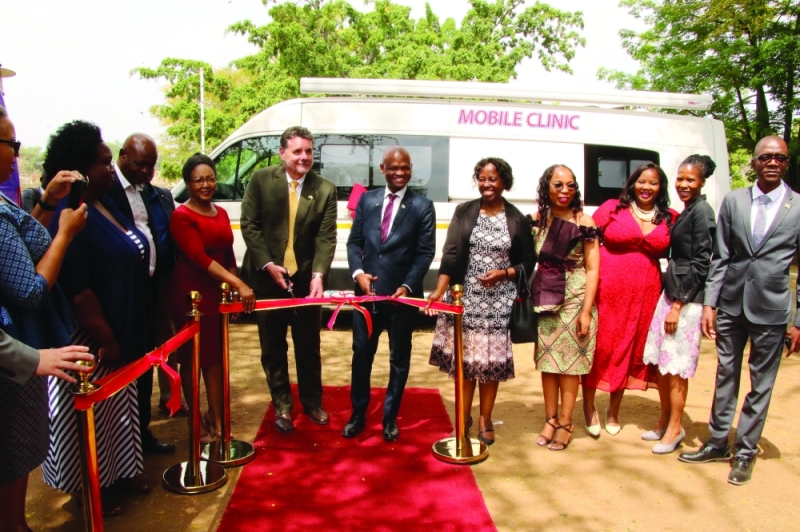Mobile clinics provide ‘last mile’ health access
Nnasaretha Kgamanyane | Monday October 16, 2023 06:00


Tebelopele, in partnership with Family Health International (FHI 360) through the aid of USAID, has pledged to leverage its newly introduced Community Clinic on Wheels to enhance access to health services for vulnerable populations in hard-to-reach areas.
The intervention is timely.
The 95-95-95 UNAIDS target challenges countries to ensure 95% of all HIV-positive individuals are diagnosed, that Antiretroviral Therapy (ARVs) are provided for 95% of the diagnosed, and that 95% of those being treated achieve viral suppression. UNAIDS has challenged countries to reach these targets by 2030.
Having already reached that target, the Botswana government, in collaboration with Tebelopele, the Ministry of Health, USAID, and other stakeholders, aspires to achieve the 100-100-100 goal by 2030, ushering in an HIV-free generation.
The imperative to attain this ambitious objective involves closing the remaining gap, locating the five percent of people unaware of their status, ensuring universal ARV coverage, and achieving viral suppression to prevent new HIV infections.
Tebelopele sees an answer to closing this gap and realising an HIV-free Botswana, in the newly launched mobile clinics, known as Community Clinic on Wheels. The clinics are expected to reach areas untouched by the Ministry of Health, mirroring the success achieved during the measles outbreak campaign earlier this year.
In the measles campaign, government was able to conduct a lightning quick immunisation that reached all corners of the country, helping to contain the disease.
The Community Clinic on Wheels project, funded by USAID for the next three years, focuses on HIV/AIDS prevention, care, treatment, and fortifying Botswana’s response for sustained HIV control.
Speaking at the Community Clinic on Wheels project, Tebelopele’s Executive Director, Dr Gaone Makwinja, emphasised that while the organisation initially provided testing through fixed sites, it had expanded its service provision in 2018. The expansion aimed at ensuring more Batswana know their HIV status and receive linked care, addressing existing gaps in the HIV effort.
“Tebelopele, through its wellness clinics, contributes to the 95-95-95 UNAIDS goals by identifying undiagnosed individuals, ensuring linkage to care and treatment, retaining patients in care, and keeping adolescent girls and young women HIV-negative,” Makwinja stated recently.
The procurement of Mobile Clinics on Wheels aims to increase access, with deployment in Gaborone, Francistown, and Kweneng East districts. These clinics offer Tebelopele the flexibility to provide services at convenient locations, including tertiary institutions, wellness fairs, malls, nearby villages, clubs, hotels, and remote areas in the implementing district.
Makwinja highlighted the success of mobile services since 2021, which include initiating 6,568 clients on Pre-Exposure Prophylaxis (PrEP), with 51% initiated in the community via mobile clinics.
She added that mobile clinics have proven instrumental in improving detection and enhancing adherence to PrEP, with 30% of individuals initiated through these clinics. A total of 53 clients out of 1,568, approximately three percent, were initiated on ARVS in the community.
Makwinja affirmed Tebelopele’s commitment to contributing to reaching the 100-100-100 target by addressing the remaining 5-2-2.
United States Ambassador, Howard Van Vranken applauded the innovative approach of Community Clinics on Wheels as an alternative to traditional healthcare delivery. He emphasised the alignment of these clinics with Botswana’s broader goal of revitalising primary healthcare and ensuring Universal Health Coverage. These clinics provide essential services at the community level, enhancing access for those who have not utilised traditional health service delivery models.
Vranken highlighted the diverse services offered by these clinics, including HIV testing, PrEP, antiretroviral treatment, viral load testing, tuberculosis screening, gender-based violence screening, post-violence clinical services, sexually transmitted infection screening and treatment, non-communicable disease screening and treatment, family planning, condom education and distribution, and more.
“Many people are not able to access public health care facilities for different reasons, and these clinics provide a vital solution to their challenges. “They give the implementing partners an opportunity to provide a range of integrated healthcare services through outreach services on scheduled days,” he explained.
Speaking at the same occasion, Minister of Health, Edwin Dikoloti acknowledged Botswana’s remarkable progress in combating the HIV/AIDS epidemic, surpassing the UNAIDS 2030 target of 95-95-95 ahead of schedule. Despite achieving 95-98-98, he stressed the collective responsibility to reach all, particularly the remaining 5-2-2 populations.
“This calls for concerted efforts as these dynamic, vulnerable and often silent populations will be extremely hard to find, and may be oblivious of their need for care, especially if they do not perceive their health as a challenge or a key priority. “These target populations will unlikely access care at conventional health facilities despite their availability and thus may unintentionally be a catalyst for re-fuelling the epidemic and reversing our historic gains,” he said.
